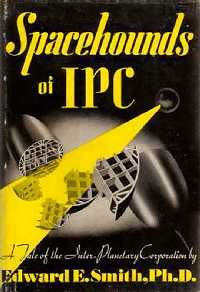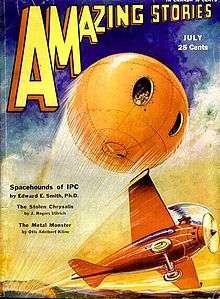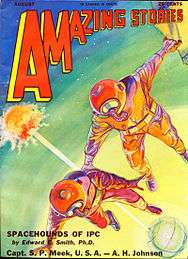Spacehounds of IPC
Spacehounds of IPC is a science fiction novel by American writer E. E. Smith. It was first published in book form in 1947 by Fantasy Press in an edition of 2,008 copies. It was the first book published by Fantasy Press. The novel was originally serialized in the August, September and October issues of the magazine Amazing Stories in 1931. Smith became disenchanted when he saw that editor T. O'Conor Sloane had made some unauthorized changes in the story, most likely to give each of the three parts it had been split into equal length.[1]
 Dust-jacket from the first edition | |
| Author | Edward E. Smith, Ph.D. |
|---|---|
| Illustrator | A. J. Donnell |
| Cover artist | A. J. Donnell |
| Country | United States |
| Language | English |
| Genre | Science fiction |
| Publisher | Fantasy Press |
Publication date | 1947 |
| Media type | Print (Hardback) |
| Pages | 257 |
| OCLC | 1234601 |
The story was the first to use the term "tractor beam", a name and concept that has been adopted by many subsequent literary works of fiction and other media until the present day.
Plot synopsis
When the Inter-Planetary Corporation's (IPC) crack liner, IPV Arcturus, took off on a routine flight to Mars, it turned out to be the beginning of an unexpected and long voyage. There had been too many reports of errors in ship's flight positions from the Check Stations and brilliant physicist Dr. Percival (“Steve”) Stevens is aboard the Arcturus on a fact-finding mission to find out what's really happening. He hopes to save the honor of the brave pilots of the space-liner Arcturus, and refute the implications of imprecision made by desk-jockeys in the Check Stations – "imprecision" being the nastiest insult one could cast at a ship's pilot. He and the pilots are right, it was the Check Stations that were out of position, not the ships.
That, however, is a cold consolation. Before the Arcturus can reach Mars it is attacked by a small, mysterious, globe-shaped spaceship. The great liner is literally cut into pieces and the attacking spaceship begins to tow the pieces toward Jupiter. Stevens and a lovely young woman passenger named Nadia Newton end up together in a large, wedge-shaped piece of the dismembered ship and they work on repairing as much equipment as they can, and in gathering needed material from other pieces floating nearby. As the pieces of the ship near Jupiter, Stevens slowly eases the large piece they are in, which they have started calling The Forlorn Hope, out of the pack and succeeds in making a near crash-landing on Ganymede, a moon of Jupiter.
Stevens and Nadia are now on Ganymede, which just happens to be Earth-like right down to the edible plants and some wildlife that's pretty tasty when cooked up right. They have a large section of the liner Arcturus which is made mostly of high grade steel, but with plenty of copper, plastics, and almost every other type of material. Also it is just chock-full of electric motors, wire, electronic equipment, tools, etc. that Steve has scavenged from the other pieces of the ship on the way to Jupiter. In short, everything Dr. Stevens needs to construct an ultra-radio set capable of reaching the inner worlds and calling for help. Before he can even start building the radio he needs power. The accumulators were discharged landing them on Ganymede and they must be recharged before anything else can be done. While Steve uses the ship for raw materials to build a hydro-electric power plant and a power beaming station to recharge the accumulators, Nadia explores the area around where they landed.
She finds a world much like Earth. She goes out each day to gather plants and animals that they can eat and keeps the stew pot full so her man can have a hot meal when he comes home from a hard day of struggling to rebuild most of Earth's basic technology from the ground up. Needless to say, he succeeds in building a power plant and recharging the accumulators. He has also built the ultra-radio except for completing the high-power output tube. He can build most of the tube with what he has, but he needs platinum to make some parts of the power tube, and it must also be sealed in a vacuum. The only answer he can see is to take The Forlorn Hope back up into space and find a platinum-bearing comet that he remembers is in the vicinity of Jupiter at that time and get the platinum from it. Then he can seal the tube in space in an almost perfect vacuum.
In their explorations of Ganymede Steve and Nadia eventually cross paths with the natives of that world. They have six limbs so they call them "Hexans". The Hexans are only at the bow and arrow stage, but they don't like these strange, four-limbed creatures invading their planet one bit. After a running battle back to The Forlorn Hope, Steve takes off to keep from being overrun by the Hexans. Since they are now in space and getting power from the power beam station he built in Ganymede, he starts running down the comet so he can finish the power tube and call for help. The comet is heading out, away from Jupiter, so it's a long chase to catch it. Finally they overtake the comet, and sure enough, it has platinum in it. Steve gets the metal he needs and starts building the parts he needs for the tube. Before he completes the task The Forlorn Hope is attacked by a ship just like the one that cut up the Arcturus and started their adventure.
As the enemy ship begins cutting up The Forlorn Hope, suddenly there is someone else in the fight. Another small globular ship arrives, but this one has a mirrored surface instead of a dull one like the attacking ship. The attacking ship immediately turns its weapon on the newcomer, but the mirror surface reflects the beam. The new ship fires back with homing missiles and destroys the enemy ship. The people manning the mirror ship are human, but a strange type of human. They are very tall with barrel chests, and pale blue in color. Steve finds they are from Saturn's moon, Titan, and were exploring inward from home and have no idea why the other ship attacked them on sight. The Titanians live on a very cold world. They use ice as a building material and think of water as "molten ice". Their blood is not blood as we know it, but a mixture of substances that don't freeze even at Titan's temperature. The substance that make up their blood are also very inflammable, to the point that if they were to stand unprotected next to an earth human they would literally burst into flame.
The ship from Titan has taken damage in the fight and must head for home. The Forlorn Hope is in pieces and at the end of its power beam, so the commander of the Titanian ship offers to tow the pieces back to Titan and help the people from earth rebuild their ship and get back to the Jupiter system. Steve and Nadia gladly accept, doing what repairs they can on The Forlorn Hope, and continuing to build the power tube on the long voyage to Titan. Upon arriving on Titan they find that one of the Titanian power plants has failed and their world is in trouble due to a lack of power. With great difficulty, due to the heat and gravity, the Titanians had built their power plants on the surface of Saturn. It would cost many lives to go back to the surface and do the repairs, so being better able to survive heat, Steve volunteers to repair the damaged power plant. Of course he succeeds, and with the help of the Titanians, the repaired and upgraded Forlorn Hope heads back to Ganymede.
When they are nearing Jupiter again they are attacked by six of the enemy spaceships. The enemy ships had moved in close and started beaming The Forlorn Hope, not knowing that while being rebuilt on Titan the Hope had been coated with the mirror substance that reflects the enemy beams and loaded with homing missiles. Steve fires the missiles, and in short order, five enemy ships are destroyed. The sixth fights hard and does some damage to the Hope before it is destroyed. Steve finally gets the damaged ship back to Ganymede and lands next his power plant. He has finished the radio and has all the power he needs, so he starts sending out an "S.O.S."
Soon help is on the way in the form of the IPV Sirius, an armed scientific vessel with two of Steve's scientist friends aboard. While the Sirius is on the way, Steve sends them all the information he has on the weapons of the enemy ships and of the Titanians, so the scientists aboard can start working on making improvements to them and finding defenses against them. The Sirius has a chance to try out her new weapons and defenses as she arrives on Ganymede to rescue the castaways. They are attacked by an enemy globe, but with their own weapons, and the improved weapons of the enemy, they destroy the enemy globe and pick up Steve and Nadia.
It this point the story moves to the rest of the wreckage of the Arcturus, and the surviving passengers and crew. As the globe ship towing them nears Jupiter it is attacked by a human ship from the moon Callisto and destroyed and the passengers and crew rescued. They are told by the Callistonians that the Jupiter system is in the final stages of a war between the Hexans and the humans of Jupiter's moons. The four major moons had all produced both Hexan and human species and they had battled from the first meetings. The war had been going on for ages and the humans had been losing. A few underground cities on Callisto and Europa were all that remain of the human populations of the moons. The men of the inner planets, and the men of the Jupiter system, join forces and with the now superior weapons and defenses available to both sides they start taking back the moons from the hexans.
During the war, the human's minor involvement is seen in a war between the Hexans and Vorkulians on the surface of Jupiter. The Vorkulians are a species completely unlike either hexans or humans. From the description of them, they could be the model for Worsel, the Velantian in the Lensman series. The story ends with the rebuilt Arcturus arriving on Mars only four hundred forty-six days, fifteen hours, eleven minutes, thirty-eight and seven-tenths seconds late.
Reception
Astounding reviewer P. Schuyler Miller declared Spacehounds to be his favorite among Smith's writings, describing it as "the most believable of all Smith's books ... show[ing] considerably greater expertness in writing than its author's previous novels."[2] E. F. Bleiler wrote that, despite the novel's one-time popularity, "The combination of a considerable amount of advanced scientific double-talk, women's magazine romance, and space battles does not succeed."[3]
References
- The History of the Science Fiction Magazine, Volume 1
- Miller, P. Schuyler (October 1947). "Spacehounds". Astounding Science Fiction. Book Review. pp. 104–105.
- Bleiler, Everett F. (1998). Science-Fiction: The Gernsback Years. Kent State University Press. pp. 397–398.
Sources
- Chalker, Jack L.; Mark Owings (1998). The Science-Fantasy Publishers: A Bibliographic History, 1923-1998. Westminster, MD and Baltimore: Mirage Press, Ltd. p. 235.
- Tuck, Donald H. (1978). The Encyclopedia of Science Fiction and Fantasy. Chicago: Advent. p. 398. ISBN 0-911682-22-8.
External links
- Spacehounds of the IPC at Faded Page (Canada)
- Spacehounds of IPC title listing at the Internet Speculative Fiction Database
- Spacehounds of IPC full text at Project Gutenberg


